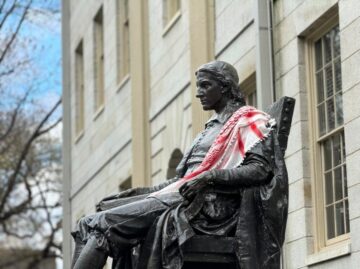Max Krupnick in Harvard Magazine:
 WHEN HAMAS TERRORISTS attacked Israel last October 7, they unleashed death and destruction—and also inflamed American prejudice on ethnic and religious grounds. Within hours, allegations of such bias came to Harvard. A hasty October 7 student letter holding “the Israeli regime entirely responsible for all unfolding violence” prompted immediate attacks on the presumed authors, and fierce denunciations of their alleged antisemitism, from within the University community and beyond. Much more was to come. In the two months following October 7, the Anti-Defamation League (ADL) reported a 337 percent increase in antisemitic incidents nationwide. The campus tensions were further heightened following the December 5 hearing where members of Congress berated then-President Claudine Gay (alongside her MIT and University of Pennsylvania counterparts) for leading campuses the representatives deemed antisemitic.
WHEN HAMAS TERRORISTS attacked Israel last October 7, they unleashed death and destruction—and also inflamed American prejudice on ethnic and religious grounds. Within hours, allegations of such bias came to Harvard. A hasty October 7 student letter holding “the Israeli regime entirely responsible for all unfolding violence” prompted immediate attacks on the presumed authors, and fierce denunciations of their alleged antisemitism, from within the University community and beyond. Much more was to come. In the two months following October 7, the Anti-Defamation League (ADL) reported a 337 percent increase in antisemitic incidents nationwide. The campus tensions were further heightened following the December 5 hearing where members of Congress berated then-President Claudine Gay (alongside her MIT and University of Pennsylvania counterparts) for leading campuses the representatives deemed antisemitic.
As the University’s task forces on combating antisemitism and combating anti-Muslim and anti-Arab bias press their work forward and prepare broad recommendations, two reports published on May 16 lay out political and alumni critiques of the Harvard campus climate. They present external and internal perspectives on antisemitism in the community, and argue that beyond individual incidents, the institution (its leadership, its administrative processes, and its curriculum) are themselves antisemitic. Published two days after the 20-day pro-Palestine encampment in the Old Yard ended, these reports represent some of the most pointed criticisms of the University arising from the events since October 7.
More here.
